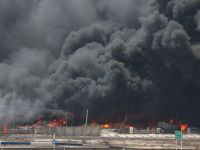Albawaba.com
Cairo
Air pollution is extremely serious in Cairo, with an almost permanent haze hanging over the city that is home to one-fourth of Egypt's population, a government agency says.
Fumes from Cairo's 1.2 million vehicles, combined with suspended particulate matter (including lead) and sand blown into urban areas from the neighboring Western Desert, create the haze, according to the Egyptian Environmental Affairs Agency.
The concentration of total suspended particulate matter in Cairo is 5-10 times higher than World Health Organization guidelines, and on average, sulfur dioxide is four times higher, smoke and lead three times higher, and nitrogen oxides two times higher.
The agency notes that this situation is worse in industrial areas and busy traffic spots, where air pollution is between three and four times the accepted level of 70 micrograms per cubic meter. The concentration of lead in certain areas of Cairo can exceed by 20 times the maximum level set by the WHO of 1 microgram per meter.
Levels of suspended particulate matter and lead pollution in Cairo are perhaps the highest in the world. Lead pollution is a serious threat to human health because high lead concentrations in the blood can lead to high blood pressure, kidney problems, infertility, decreased I.Q. levels in children, and disorders to the nervous system.
Air pollution in Cairo is estimated to cause between 10,000 to 25,000 additional deaths per year. In response, the government and several donor agencies are collaborating to monitor pollution and implement programs to improve air quality. The US Agency supports the "Cairo Air Improvement Project," initiated in 1995 for International Development, and four programs are being implemented with the Organization for Energy Planning.
The program aims to reduce vehicular emissions of harmful air pollutants and improve fuel efficiency. The testing program, along with a Tune Up Certification Program, is designed to encourage motorists to tune up their engines to reduce harmful emissions from faulty engines.
Because only unleaded fuel is sold in Cairo (the rest of the country is expected to follow suit by 2002), smelters are the main source of lead pollution: three lead smelters produce from 40 to 60 percent of lead pollution in the area.
The program is helping public smelters upgrade their operations with the goal of reducing lead emissions from smelters by 90 percent. In several cases, it has helped to relocate lead smelters outside of Cairo to reduce particulate matter and other forms of air pollution.
Last year, the largest lead smelting company agreed to vacate its facilities in Shubra al-Kheima in industrial northern Cairo, where there is chronic air pollution from a heavy sprinkling of factories and a densely populated residential district.
In return, the Egyptian government will build the company a new facility equipped with modern technology and emission control systems outside Cairo.
The pollution reduction program has 36 monitoring stations around Cairo. Seven of them participate in another government project that set up monitoring stations to check lead levels and help experts build an information database as part of Egypt's ongoing efforts to reduce air pollution.
© 1969 Al Bawaba (www.albawaba.com)







